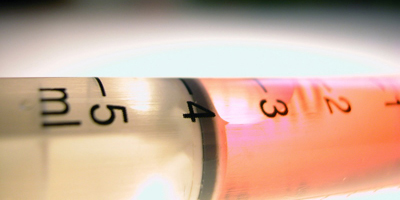
 CLEMSON—In vitro fertilization, and technology that is helping turn the procedure into an acceptable alternative to natural pregnancy, is rapidly outpacing our moral discernment.
CLEMSON—In vitro fertilization, and technology that is helping turn the procedure into an acceptable alternative to natural pregnancy, is rapidly outpacing our moral discernment.
That was the central message delivered April 7 by Father Tadeusz Pacholczyk, Ph.D., during an appearance at Clemson University.
Father Pacholczyk spoke to approximately 100 people on the topic “Science, Medicine and Ethics: Assisted Reproductive Technologies and ‘Octomom.’”
“In vitro fertilization is starting to become standard operating procedure” in some parts of the world, Father Pacholczyk said. In the Scandinavian countries, in vitro fertilization is used in one to two percent of all pregnancies.
“It has achieved a certain level of acceptability,” he said.
Father Pacholczyk, director of Education at the National Catholic Bioethics Center and author of “Making Sense Out of Bioethics,” said an informed societal discussion on these issues is needed because they involve the genesis of the next generation of human beings.
“When you talk about in vitro fertilization, this is the best example of what we mean by the slippery slope,” he said.
Thirty years ago, when the first test-tube baby was conceived, no one knew that society would eventually talk about creating embryonic human beings for research.
“How far and how quickly indeed we have come,” Father Pacholczyk said.
In his talk, one of several he gave in the Upstate and Midlands this month, Father Pacholczyk launched into what he called “an in-depth discussion of the moral and ethical difficulties that are raised by this technology.”
 Father Pacholczyk took his audience, via a PowerPoint presentation, through the creation of an embryo. When does a pregnancy begin: when a sperm fertilizes an egg or when the embryo attaches to the uterus?
Father Pacholczyk took his audience, via a PowerPoint presentation, through the creation of an embryo. When does a pregnancy begin: when a sperm fertilizes an egg or when the embryo attaches to the uterus?
“If you could say that a pregnancy doesn’t begin until the embryo plants his or herself to the uterus then it would be possible to say that prior to that point, since no pregnancy has been initiated, then we’re not really dealing with a human being,” he said.
Applying that rationale could then make it morally acceptable to use that embryo for stem cell extraction.
“It becomes easier to make a move like that if you say that pregnancy occurred at this late timeframe,” Father Pacholczyk said.
He added that this thinking has come about recently with science’s ability to follow the pregnancy process more closely.
“Early on, if you consulted any embryology textbook there was never any ambiguity that pregnancy began with fertilization,” he said.
To support that Father Pacholczyk played a video clip of an interview of then-pregnant supermodel Kathy Ireland, in which she said she came to the realization that life is created at conception.
“The DNA is there, the sex is determined, the blood type is determined, the unique set of fingerprints is there,” Ireland said during an appearance on Fox News.
Ireland said the “clump of cells” that form at conception “is the way a human being is supposed to look at its earliest stage.”
Father Pacholczyk said Ireland reached that understanding by immersing herself in the medical research of human development.
“At the root of all ethical analysis of these kinds of questions is an absolute necessity to be familiar with the proper science,” he said.
The rapid development of a variety of techniques now common with in vitro fertilization is also inserting eugenics into the equation, Father Pacholczyk said. It allows the operators of fertility clinics and future parents who go there to weed out genetically diseased embryos and thereby deliver a “normal” child.
The process is called pre-implantation genetic diagnosis. Such techniques are becoming more common in determining the sex of an embryo, he said, and it opens up the possibility of “designer babies.”
“In the case where an embryo is a carrier for particular disease states or other disorders, it would either be frozen or poured down the sink,” he said.
Father Pacholczyk, a priest of the diocese of Fall River, Mass., spoke about a dual sacredness that is threatened with the rapid advancement of the science of in vitro fertilization.
“There’s obviously a sacredness of the human being that must be respected, but there’s also the sacredness of procreation itself. It’s one, I’m afraid, that we have seriously begun to lose touch with,” he said.
He said we are losing the God-given gift of our sexuality and our bodies in their relationship to members of the opposite sex.
“There’s something very sacred about procreation itself,” he said.
The controversy surrounding in vitro fertilization was raised to a new level last year when Nadya Suleman gave birth to octuplets.
She was immediately dubbed the “octomom” by the media and drew criticism after it was learned that Suleman, who was on welfare at the time, intended to give birth to as many babies as she could, without regard to the economic and moral implications.
“There was a raw exercise of willfulness here,” Father Pacholczyk said of the multiple births. He said a husband and a wife don’t have a right to bear children, but that natural procreation is a gift from God fulfilled through the marital act.
“The gift of human life must always be actualized in marriage through the body-to-body self-giving,” the priest said.
Father Pacholczyk’s talk was co-sponsored by Students for Life at Clemson. He spoke last year at the school on stem cell research.
